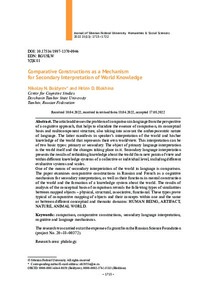Сравнительные конструкции как механизм вторичной интерпретации знаний о мире
Скачать файл:
URI (для ссылок/цитирований):
https://elib.sfu-kras.ru/handle/2311/148787Автор:
Болдырев, Н. Н.
Блохина, Е. Д.
Boldyrev, Nikolay N.
Blokhina, Helen D.
Дата:
2022-11Журнал:
Журнал Сибирского федерального университета. Гуманитарные науки. Journal of Siberian Federal University. Humanities & Social Sciences; 2022 15 (11)Аннотация:
Антропоцентрический характер языка проявляется в том, что
в своей языковой деятельности каждый человек формирует собственное видение
мира, что является его определенной интерпретацией, которая может быть двух
типов: первичная и вторичная. Объектом первичной языковой интерпретации
является сам окружающий мир и происходящие в нем изменения. Вторичная
языковая интерпретация связана с осмыслением и переосмыслением знаний
о мире с новых позиций и точек зрения в контексте разных систем знаний, мнений
и оценок коллективного и индивидуального уровня. Один из способов вторичной
интерпретации мира в языке – сравнение.
В статье на материале русского и французского языков рассматриваются
сравнительные конструкции в качестве когнитивного механизма вторичной
интерпретации, их функции в ментальном конструировании мира и формировании
системы знаний о нем. С позиций когнитивного подхода изучается сущность
сравнения, его основа и многокомпонентная структура. В результате анализа
концептуальных основ сравнения выделяются следующие типы сходства
сопоставляемых объектов – физическое, структурное, ассоциативное,
функциональное. Изучается специфика функционирования сравнения при
сопоставлении концептов внутри одной или между разными концептуально-тематическими
областями – ЧЕЛОВЕК, АРТЕФАКТ, ПРИРОДА, ЖИВОТНЫЙ
МИР The article addresses the problem of comparison in language from the perspective of a cognitive approach, that helps to elucidate the essence of comparison, its conceptual basis and multicomponent structure, also taking into account the anthropocentric nature of language. The latter manifests in speaker’s interpretation of the world and his/her knowledge of the world that represents their own worldview. This interpretation can be of two basic types: primary or secondary. The object of primary language interpretation is the world itself and the changes taking place in it. Secondary language interpretation presents the results of rethinking knowledge about the world from new points of view and within different knowledge systems of a collective or individual level, including different evaluative systems and scales.
One of the means of secondary interpretation of the world in language is comparison. The paper examines comparative constructions in Russian and French as a cognitive mechanism for secondary interpretation, as well as their functions in mental construction of the world and the formation of a knowledge system about the world. The results of analysis of the conceptual basis of comparison reveals the following types of similarities between mapped objects – physical, structural, associative, functional. These types prove typical of comparative mapping of objects and their concepts within one and the same or between different conceptual and thematic domains: HUMAN BEING, ARTIFACT, NATURE, ANIMAL WORLD

